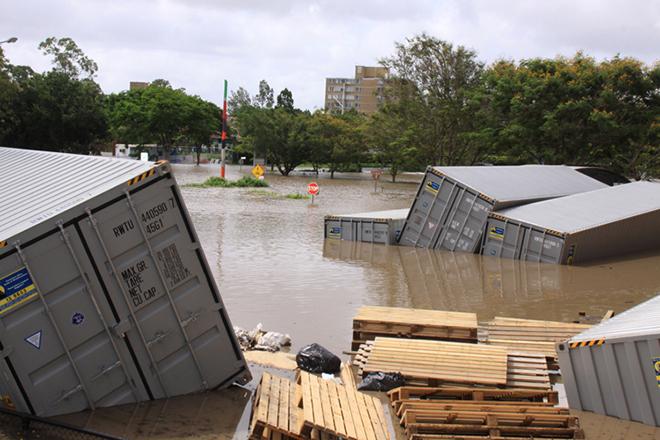Warming ocean worsened Australia’s fatal 2010/2011 floods
by WHOI on 21 Nov 2015

he floods in Australia’s northeast state of Queensland claimed 35 lives, caused $2.38 billion damage, flooded 28,000 homes and left 100,000 people without power. So much rain fell on Australia that it led to a rare filling of Lake Eyre, a large lake system in the interior of the country, and caused a drop in global sea level. (Photo by Markus Gebauer / Shutterstock.com) WHOI
As world leaders gather in Paris at the end of the month for the COP 21 climate summit, new research from scientists reveals the destructive impact the warming global ocean can have on society. A study by a team of U.S. and Australian researchers shows that long-term warming of the Indian and Pacific oceans played an important role in increasing the risk of the kind of devastating floods that struck Australia in 2010/2011. The study was published in Geophysical Research Letters.
The floods in Australia’s northeast state of Queensland claimed 35 lives, caused $2.38 billion damage, flooded 28,000 homes and left 100,000 people without power. So much rain fell on Australia that it led to a rare filling of Lake Eyre, a large lake system in the interior of the country, and caused a drop in global sea level.
“The sea surface temperatures around Australia during 2010/2011 were on average 0.5°C warmer than they were 60 years ago,” said lead author Caroline Ummenhofer, a physical oceanographer with Woods Hole Oceanographic Institution (WHOI). “While many past studies have found a global warming link to heat extremes, this study is one of the first to show how ocean warming can impact a heavy rainfall event.'
In the summer of 2010/2011, Australia was surrounded by extremely warm sea surface temperatures, particularly in the eastern Indian Ocean, western Pacific warm pool region – to the north and east of Papua New Guinea – and the Coral Sea.
It led to a summer where rainfall in Australia’s northeast was 84 percent above average and soil moisture measurements were the highest recorded since 1950. This was in spite of it being an average cyclone season.
Both a strong La Niña event and long-term ocean warming contributed to the unusually warm ocean conditions around Australia in 2010/2011. Ummenhofer and her colleagues ran numerical experiments to try to understand how different factors contributed to the unusual 2010/2011 conditions: One experiment included the long-term warming in addition to the La Niña sea surface temperatures, while the other had removed the warming trend. Their research determined that due to warmer sea surface temperatures, Australia was three times as likely to get this much rain during a strong La Niña event.
“The additional warming of the oceans has profound impacts on the atmosphere. It increases the amount of moisture in the atmosphere and can intensify rain-producing circulation conditions,” said co-author Prof Matthew England from the ARC Centre of Excellence for Climate System Science.
“This is why in 2010/11 more moisture was brought onshore along Australia’s east coast. Stronger rising motion over the northeast resulted in higher rainfall, making it more likely for Australia to suffer extreme rainfall conditions during this strong La Niña.”
In addition to the warming oceans bringing more rainfall, previous research has also shown that as a result of global warming, strong La Niña and El Niño events are likely to become more frequent.
“Australia has long been acknowledged as a country of extremes but this research suggests extreme rainfall events may become far more frequent in a warming world,” said Ummenhofer. “As we come into climate change talks in Paris, this research offers yet another incentive for countries around the world to take action to forestall global warming.”
This study was supported by the Australian Research Council (ARC), including funding from the ARC Centre of Excellence for Climate System Science, the ARC Laureate Fellowship program, the Penzance and John P. Chase Memorial Endowed Funds and the Ocean Climate Change Institute at WHOI.
The Woods Hole Oceanographic Institution is a private, non-profit organization on Cape Cod, Mass., dedicated to marine research, engineering, and higher education. Established in 1930 on a recommendation from the National Academy of Sciences, its primary mission is to understand the ocean and its interaction with the Earth as a whole, and to communicate a basic understanding of the ocean's role in the changing global environment. For more information, please visit website.
If you want to link to this article then please use this URL: www.sail-world.com/140298